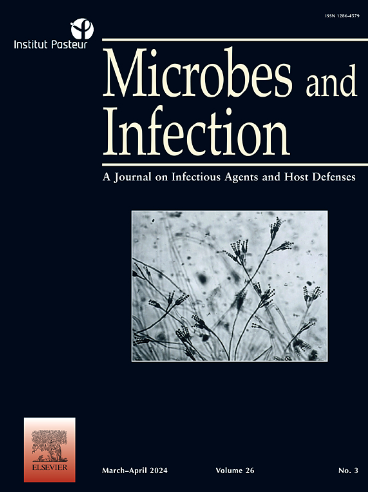Cutibacterium acnes as an overseen autoimmunity trigger: Unearthing heat-shock driven molecular mimicry
IF 2.7
4区 医学
Q3 IMMUNOLOGY
引用次数: 0
Abstract
Cutibacterium acnes, common resident of the human skin, can establish both commensal and pathogenic relations with the human host; however, long-term consequences of C. acnes-induced inflammation remained un(der)explored. To infer the capacity of triggering autoimmunity in humans via molecular mimicry, a comprehensive immunoinformatics analysis of the experimentally characterized C. acnes proteome was performed. The protocol included homology screening between the C. acnes and the human proteome, and validation of shared specificity regions against the collection of experimentally characterized T-cell epitopes, related to autoimmunity. To obtain highly reliable predictions, the results were subjected to additional cross-validation by a dedicated MHC-restriction analysis, including a docking study of C. acnes mimotopes and human counterparts with the highest degree of sequence similarity to MHCII molecules representing the highest risk for detected autoimmune pathologies. Due to mimicking of highly immunogenic, but also evolutionary conserved autoantigens from the Heat Shock protein family, association between C. acnes and the pathogenesis of highly incident autoimmune diseases: Type 1 Diabetes, Rheumatoid Arthritis, and Juvenile Idiopathic Arthritis, was found. To the best of our knowledge, this study is the first one to provide preliminary information and a mechanistic link on the putative involvement of C. acnes in the pathogenesis of autoimmunity in humans.
痤疮分枝杆菌是一种被忽视的自身免疫诱因:揭示热冲击驱动的分子拟态
痤疮丙酸杆菌是人类皮肤的常见寄生菌,可与人类宿主建立共生和致病关系;然而,痤疮丙酸杆菌诱发炎症的长期后果仍有待探索。为了推断痤疮丙酸杆菌通过分子模仿引发人类自身免疫的能力,我们对实验表征的痤疮丙酸杆菌蛋白质组进行了全面的免疫信息学分析。该方案包括痤疮丙酸杆菌与人类蛋白质组之间的同源性筛选,以及针对实验表征的与自身免疫相关的 T 细胞表位集合对共享特异性区域的验证。为了获得高度可靠的预测结果,还通过专门的 MHC 限制分析对结果进行了交叉验证,包括痤疮丙酸杆菌模拟物与人类对应物的对接研究,这些模拟物与 MHCII 分子的序列相似度最高,代表了检测到的自身免疫性病症的最高风险。由于痤疮丙酸杆菌模仿了热休克蛋白家族中高免疫原性但也是进化保守的自身抗原,因此痤疮丙酸杆菌与高发自身免疫性疾病的发病机制存在关联:我们发现痤疮丙酸杆菌与高发自身免疫性疾病(1 型糖尿病、类风湿关节炎和幼年特发性关节炎)的发病机制存在关联。据我们所知,这项研究首次提供了痤疮丙酸杆菌可能参与人类自身免疫性疾病发病机制的初步信息和机制联系。
本文章由计算机程序翻译,如有差异,请以英文原文为准。
求助全文
约1分钟内获得全文
求助全文
来源期刊

Microbes and Infection
医学-病毒学
CiteScore
12.60
自引率
1.70%
发文量
90
审稿时长
40 days
期刊介绍:
Microbes and Infection publishes 10 peer-reviewed issues per year in all fields of infection and immunity, covering the different levels of host-microbe interactions, and in particular:
the molecular biology and cell biology of the crosstalk between hosts (human and model organisms) and microbes (viruses, bacteria, parasites and fungi), including molecular virulence and evasion mechanisms.
the immune response to infection, including pathogenesis and host susceptibility.
emerging human infectious diseases.
systems immunology.
molecular epidemiology/genetics of host pathogen interactions.
microbiota and host "interactions".
vaccine development, including novel strategies and adjuvants.
Clinical studies, accounts of clinical trials and biomarker studies in infectious diseases are within the scope of the journal.
Microbes and Infection publishes articles on human pathogens or pathogens of model systems. However, articles on other microbes can be published if they contribute to our understanding of basic mechanisms of host-pathogen interactions. Purely descriptive and preliminary studies are discouraged.
 求助内容:
求助内容: 应助结果提醒方式:
应助结果提醒方式:


